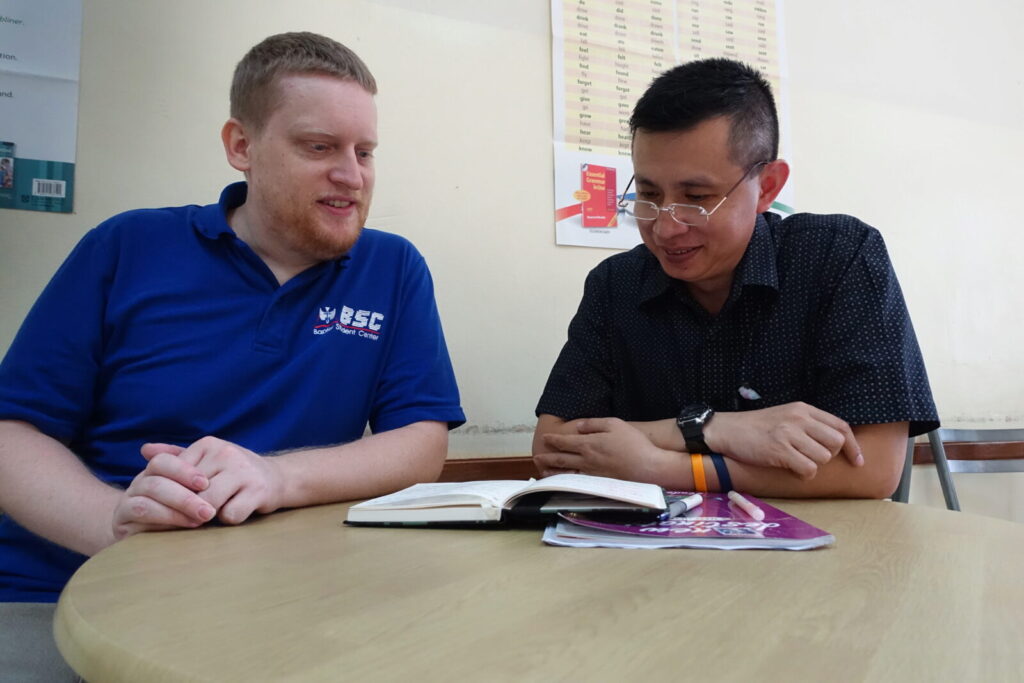A sudden job loss gave Bridge graduate Brandon Benoit an unexpected silver lining as it led him to teaching adventures in South Korea, China, and Thailand. He details his experience at various types of schools in these Southeast Asian countries and offers tips on how ESL educators can grow a teaching career abroad and online.
Can you tell us a bit about yourself, Brandon?
I’m from Virginia in the USA. For my undergrad, I earned a BA in Communication Studies. In January 2020, I finished my MA in TESL.
Before teaching, I worked as a Master Control Operator for a local TV station and worked my way to the job of Marketing Producer. That job required me to write and produce commercials to promote our news and events. I lost my job in 2009 when the economy started to spiral. Because of this, work in my field became hard to come by.
How did you get started in the teaching field?
Deciding to “reboot” at 30
I began teaching English in August of 2009. After losing my marketing job, my American college roommate contacted me about teaching at an international school in South Korea. He had been teaching overseas for a few years and thought I’d love it. I was intrigued by the possibility of living overseas for the first time in my life. It was an adventure that I called “My Reboot at 30” because I had just turned 30 that year. I contacted the organization he worked for and was told that they had three schools in and around Seoul.
Landing a job in Seoul
After applying to my former roommate’s school and being denied, they passed my application to one of the other two schools in the network. The school director happened to be in the US for his daughter’s college graduation and interviewed me. A couple of weeks later, he called me from South Korea to offer me the job. I was both excited and nervous at the same time. I worked there for six years and South Korea became my second home.
Transitioning to other countries
Unfortunately, South Korea began requiring state teaching certification, which I didn’t have, and the school downsized me. The next year, I filled an emergency teaching post for another friend in Dongguan, China. I was only there for three months to help them finish the school year, but this was the biggest opportunity for me to grow in my field.
After the school year ended, I returned to the US, and soon my Thai roommate from my school in South Korea contacted me because he was now working at a language center in Bangkok and invited me to join his school.
Taking the next career step
In 2019, I returned to the US because I was working on my M.A. in TESL. I decided to take a furlough so I could focus on my studies.
Is an MA in TESOL right for you? Find out!
What kinds of schools have you worked for?
I’ve taught in a wide spectrum of educational institutions.
In South Korea, I taught at an international school which caters to students whose families have transplanted to another country for work (airline pilots, businessmen, military, etc.) or hold passports from other countries outside Korea (including Koreans who were born abroad) and were at our school because English was their first or desired language. Many Korean parents would send their kids to these schools in hopes of preparing them for universities outside of Korea through English immersive education.
In China, I taught at a Chinese public school, which was a very different experience because the Chinese education style was quite different from the American style of the international school in Korea. Most classes at this school were conducted in the native language and my English class was one of the few they’d take each week for practicing conversational English. Most students here had no dreams of studying abroad but hoped to be able to get jobs in China where English would help boost their resumé.
Finally, in Thailand, I taught at a language learning center. This school was geared toward adults who would come after work and students who wanted to get extra English training.
What types of learners have you taught?
I’ve taught pretty much all ages and proficiency levels. I did community service with a church in Korea teaching kids as young as five, and in Thailand taught the sweetest class of retirees who were trying to keep their minds active by learning English on a weekly basis.
Most of my students in Korea were at an advanced to native English proficiency. In China, however, the majority of my students in elementary classes were low to high beginners while my middle school classes were low to high intermediate. I had to learn how to adapt to these new teaching challenges.
At the school in Bangkok, I was teaching mostly adults and upper-level high school students. The levels at this school ranged from high beginners to advanced.
What were your teaching schedules like?
In Korea, my school was like schools here in the US, which would have you teach during regular school hours, but you’d also have to option to tutor if you wanted.
When I was in China, my class schedule varied so I had to learn to be more flexible. Because examinations were based on a system-wide schedule, sometimes my classes would be canceled because they were required to take their exams at a specific time determined by the government. Unfortunately, this hurt some of my classes because these students would only meet with me once a week, so some classes would miss an entire week and it wouldn’t be made up. At the same time, my boss also insisted that I tutor his son during my free time on the weekend. I was paid extra for it, but this was more of an expectation than a suggestion.
In Thailand, the language center was very different in time structure. Because the school was geared toward teaching working adults, most classes met in the evening (similar to Korean hagwons, which are like an after-school school for students looking to work on specific skills) or on weekends. This was a bit nice because I was able to explore the culture during the day.

Brandon tutoring one of his adult students
Now that you’re back home in Virginia working on your master’s degree, where are you currently teaching?
Currently, I’m teaching English online both at the university level and in an online language school. At the university level, I was recently hired to teach teachers who are going into TESL education. My roommate from my school in Korea, who was also my boss in Thailand, created the online language school, so he recruited me.
How did your work experience in media help you as an English teacher?
Working in this field helped me as I developed classes, such as a video production class and a TV English class. A background in video has also helped me understand the benefits of video production being incorporated into both my physical and digital classrooms.

Brandon’s TV English class
What have been some of your favorite ESL activities?
The TV English class was one of my favorite classes I taught in Thailand. Depending on the proficiency level, I would show either a clip from an English show or the entire episode. For my intermediate students, we would learn new vocabulary or idioms and have a brief conversation based around the theme of the clip we would watch. After watching the clip, I would model sentences using the vocabulary and they could adapt the sentences to make their own. I would also ask questions using the vocabulary to check their comprehension of the word or idiom and have comprehension questions to test their level of understanding of the story in the clip.
Learn other ways to teach English using video in this new, free Bridge Micro-credential course!
My advanced class would also learn new vocabulary or idioms and then watch an entire episode of a show. The concept was more to practice listening and comprehension skills. After the episode finished, we would have a discussion about the themes in the episode and apply them to our everyday lives. These classes were very popular.
How has the COVID-19 crisis affected you as an English teacher?
One of the big issues I’ve seen during this crisis is the effect it has had on the need for teachers overseas. In some cases, places are actively looking, but coming from the US is making it difficult to get into some countries now due to the rise in cases here. As an online teacher though, it has been a great way to connect from home.
Currently, I’m tutoring a student in China who is looking to come to the US to learn in our school system. Being able to work with him online is helping him prepare from where he lives on how to deal with cultural differences and practice his English with a native speaker. It’s also helping him prepare to deal with the online classroom as he will probably begin his school year learning online with an American school while still living in China.
You took the Bridge Master TEFL/TESOL Certification course. Why did you decide to take this course and did it help you professionally?
At the time, I had left Korea because I didn’t have the state certification that was required to teach in Korean international schools. Having a TEFL certification helped me at least get my foot in the door in Thailand, which needed certification of some type for the school I was teaching in, but not certification at a state level.
This was the first class I’d taken in TEFL as I didn’t study education in my undergrad. While I had taught classes with ESL students for about seven years, I’d never taken any formal classes. It was great to see how much I’d learned about TEFL during that time, but it also helped give me new tools I could use in the future.
Browse online TEFL courses to get certified.
Where would you like to teach next once you’re finished with your studies?
If I could return to Asia, I would love to go back to South Korea. I left a piece of my heart in that country and feel it’s my second home. The people there were so friendly and giving of themselves. I have created friendships that will last for life. However, if I were to choose a country other than one I’ve been to, I’d probably have to say Taiwan or Malaysia. I have friends in both places and I’ve loved my visits there.
Do you have any advice for teachers who would like to teach abroad?
Don’t burn your bridges
Try to keep good relations with all of your previous places of employment because they could help you in the future. If you work hard, your efforts will be seen and could lead to new experiences.
Accept cultural differences
Be prepared that sometimes the culture you’re going into has expectations of hierarchy and job requirements that are different from the way you may expect them to be back in your home culture.
Have a heart for helping your students
Students, especially those who are boldly trying to learn a new language, can be easily scared away if they feel intimidated or judged by teachers. I had a student in Thailand who had a bad experience at a young age with his English teacher in his Thai school. He was harshly scolded in front of his classmates as being “stupid” because he couldn’t spell “an easy word like ‘cat’.” this caused him to shut down from wanting to learn English at all. Now, at 18, he was very nervous to make any kind of mistake in class out of fear of the same thing happening. He was often apprehensive about speaking up and used his Thai about 70% of the time and his English only about 30%.
However, on my first day of class, I would always tell my students that I would never make fun of them, I would never laugh at their mistakes, and I would never intentionally embarrass them in front of their class. As a teacher, it’s my job to make them want to learn, not be afraid of it. Once I proved this to the boy, he made a 180-degree turn in his learning and became more vocal in class (using his English 70% of the time now) and not as reticent about making mistakes. Even though I’m not in Thailand anymore, I still talk to this young man who continues to improve his English in his university.

Brandon and his Thai student, Poom, during the Songkran Festival (Thai New Year) in Bangkok.
Take teaching seriously
While teaching overseas can be an adventure, don’t make the adventure your main reason for going. I’ve met people that only started teaching overseas because they wanted to live in another country and looked at it as a long vacation or they viewed it as a way to make quick money, and they put teaching as their second priority. Believe me, I have had some great adventures and seen many wonderful places during my time overseas, but I had to take the teaching part seriously. Some countries are starting to become wise to these types of people and are course-correcting.
Your love of teaching and helping students should be your priority and, honestly, it can help you reap the greatest rewards. The greatest joy I get is seeing a student who has struggled with a concept have the lightbulb moment where it finally clicks.







